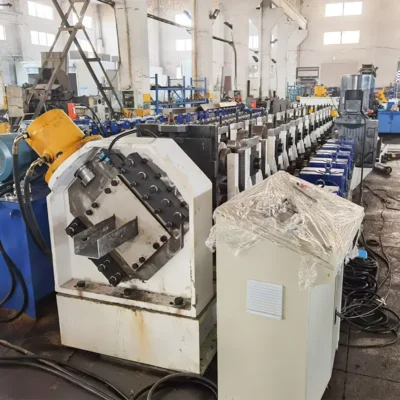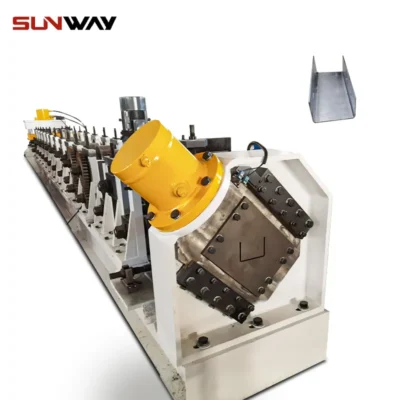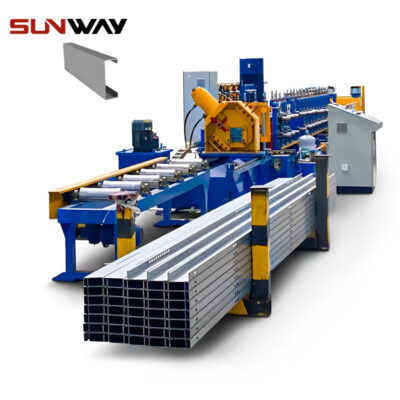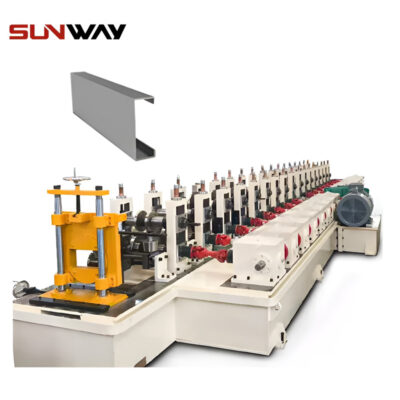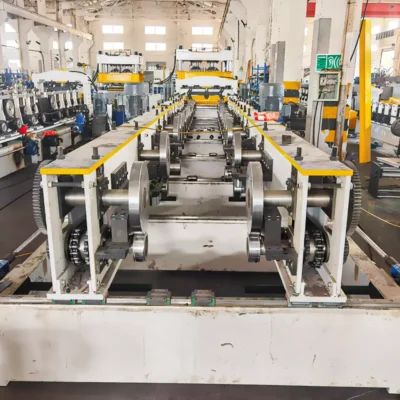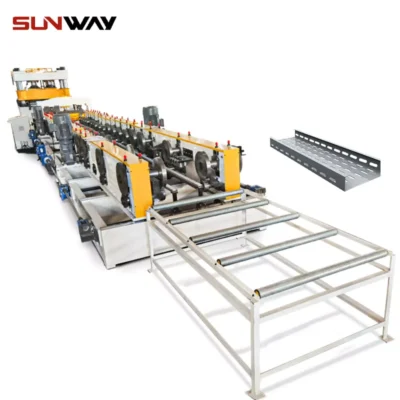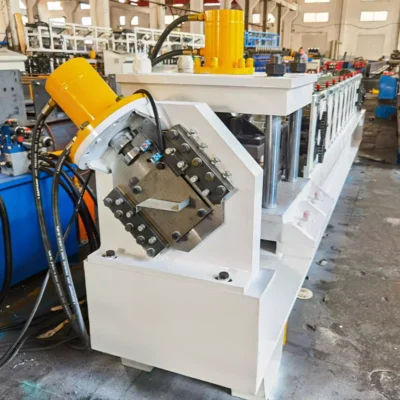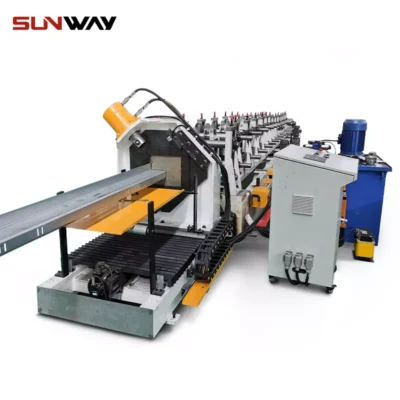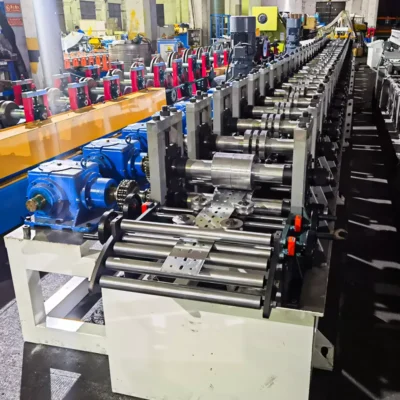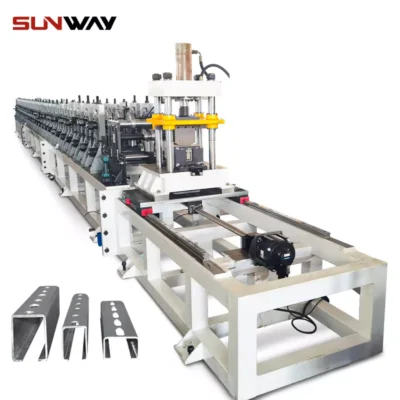When it comes to manufacturing step beams—those critical components used in racking systems, shelving, and structural frameworks—one machine stands out as the industry workhorse: the Step Beam Roll Forming Machine. This piece of equipment is the backbone of efficient, high-quality production, turning raw metal into precision-engineered beams. In this comprehensive guide, we’ll explore everything from machine types and applications to pricing, maintenance tips, and why Wuxi Sunway Machinery is a trusted leader in the field.
So, whether you’re a seasoned manufacturer or just starting out, this article is your one-stop resource for all things related to Step Beam Roll Forming Machines. Let’s dive in!
Overview of Step Beam Roll Forming Machines
Picture this: you’ve got a blank piece of sheet metal, and in just minutes, it’s transformed into a durable, high-precision step beam ready for heavy-duty applications. That’s the magic of a Step Beam Roll Forming Machine.
This machine uses a series of rollers to gradually shape metal into the desired beam profile. It’s like kneading dough into the perfect loaf—but instead of bread, you’re creating strong, uniform beams used in industrial shelving, pallet racking, and more. The efficiency, precision, and scalability make this machine an essential tool for industries like warehousing, logistics, and construction.
But what really sets it apart? Its ability to consistently produce beams that meet strict quality standards, all while minimizing waste and downtime. Let’s break down its features and advantages in detail.
Applications of Step Beam Roll Forming Machines
Step beams are everywhere—you just don’t notice them! From warehouses to retail outlets, they form the backbone of many structural systems. Here’s a closer look at their applications:
1. Pallet Racking Systems
If you’ve ever walked into a warehouse, you’ve likely seen pallet racks. These racks rely on step beams to support pallets loaded with goods. The beams need to be strong, uniform, and capable of handling heavy loads—qualities that roll forming machines deliver with ease.
2. Industrial Shelving
Step beams are integral to industrial shelving units, which are used in factories, workshops, and retail storage areas. The beams ensure stability and durability, even under significant weight.
3. Construction Frameworks
In construction, step beams are often used as part of structural frameworks. Their precision and strength make them ideal for supporting heavy loads in buildings and other structures.
4. Retail Display Units
Ever wondered how those perfectly aligned retail shelves are made? Step beams! Their uniform profiles ensure that shelves are level, stable, and aesthetically pleasing.
5. Mezzanine Floors
Step beams are also used in mezzanine flooring systems, providing the structural integrity needed to support additional floor space in warehouses and industrial facilities.
These applications highlight just how versatile and indispensable step beams are. And the best part? A Step Beam Roll Forming Machine can handle all these requirements with ease.
Types of Step Beam Roll Forming Machines
Not all roll forming machines are created equal, and choosing the right type depends on your production needs. Here are the main types of Step Beam Roll Forming Machines:
1. Manual Step Beam Roll Forming Machines
These are basic machines that require significant operator input. While they’re more affordable, they’re not ideal for high-volume production.
2. Semi-Automatic Step Beam Roll Forming Machines
A middle ground between manual and fully automatic systems, these machines offer partial automation, improving efficiency without breaking the bank.
3. Fully Automatic Step Beam Roll Forming Machines
These machines are the gold standard for industrial production. They handle everything from material feeding to cutting and punching, with minimal operator intervention.
4. Custom Step Beam Roll Forming Machines
For businesses with unique requirements, custom machines are the way to go. They’re designed to produce beams in non-standard profiles, lengths, or materials.
Comparison Table: Types of Step Beam Roll Forming Machines
| Machine Type | Automation Level | Production Speed | Ideal For | Price Range (USD) |
|---|---|---|---|---|
| Manual | None | Low | Small-scale production | $5,000–$10,000 |
| Semi-Automatic | Partial | Medium | Medium-scale production | $15,000–$25,000 |
| Fully Automatic | Full | High | High-volume industrial operations | $30,000–$60,000+ |
| Custom | Variable | Variable | Unique or specialized applications | Dependent on design |
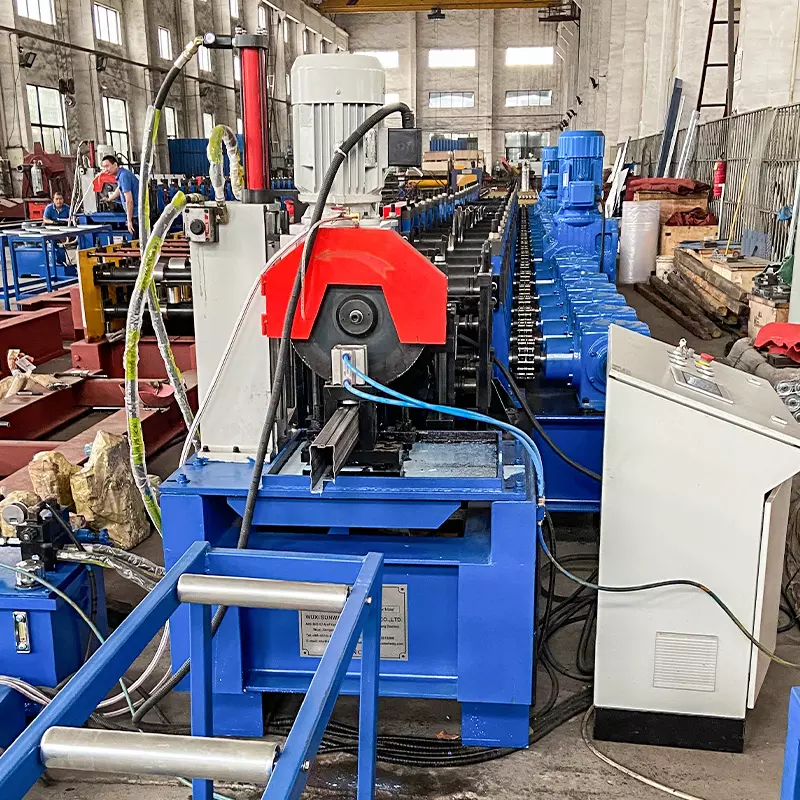
Step Beam Roll Forming Machine Price: What to Expect
The price of a Step Beam Roll Forming Machine can vary widely based on factors like automation level, production capacity, and customization. Here’s a quick breakdown:
Factors Affecting Price
- Automation Level: Fully automatic machines are more expensive but offer higher productivity.
- Material Compatibility: Machines that can handle a wide range of materials, like galvanized steel and stainless steel, tend to cost more.
- Customization: Custom-designed machines for unique profiles or applications come with a premium price tag.
- Brand and Quality: Established manufacturers like Wuxi Sunway Machinery offer high-quality machines that deliver excellent ROI.
Price Ranges
- Manual Machines: $5,000–$10,000
- Semi-Automatic Machines: $15,000–$25,000
- Fully Automatic Machines: $30,000–$60,000+
- Custom Machines: Dependent on design and requirements
Pro Tip:
When comparing prices, don’t just look at the upfront cost. Consider the machine’s production capacity, maintenance needs, and energy efficiency. A slightly pricier machine with higher efficiency can save you money in the long run.
For competitive pricing and top-notch quality, get in touch with Wuxi Sunway Machinery. Their machines are known for their durability, precision, and value for money.
Specifications of Step Beam Roll Forming Machines
Knowing the specifications of a roll forming machine is crucial for making an informed purchase. Here are the key specs to look out for:
| Specification | Details |
|---|---|
| Material Thickness | 1.5mm–3.5mm |
| Material Type | Galvanized steel, stainless steel, aluminum |
| Forming Speed | 10–20 meters per minute |
| Roller Material | High-strength steel with chrome plating |
| Power Supply | Typically 380V/50Hz (customizable based on region) |
| Control System | PLC (Programmable Logic Controller) |
| Cutting System | Hydraulic cutting for precision |
Why These Matter:
- Material Thickness and Type: Determines the range of projects the machine can handle.
- Forming Speed: Impacts production efficiency.
- Control System: Ensures precision and reduces errors.
Machines from Wuxi Sunway Machinery are built to meet these high standards, ensuring you get a product that’s both reliable and efficient.
Maintenance Tips for Step Beam Roll Forming Machines
Think of your roll forming machine as a long-distance runner—it needs regular care to keep performing at its best. Here are some tips:
1. Daily Cleaning
Remove debris and dust from the rollers and feeding area to prevent wear and tear.
2. Lubrication
Keep all moving parts well-lubricated to ensure smooth operation. Use the manufacturer-recommended lubricant for best results.
3. Inspect Rollers
Rollers are the heart of the machine. Regularly check them for signs of wear and replace them if necessary.
4. Calibration
Ensure the machine is calibrated correctly to maintain accuracy and minimize material waste.
5. Professional Servicing
Schedule periodic maintenance checks with professionals to identify and fix potential issues before they escalate.
Following these tips can extend the lifespan of your machine and maintain its efficiency. For expert servicing, you can always rely on Wuxi Sunway Machinery to provide top-notch support.
FAQs About Step Beam Roll Forming Machines
Got questions? Here are answers to some of the most frequently asked questions about Step Beam Roll Forming Machines:
| Question | Answer |
|---|---|
| What materials can these machines process? | Most machines handle galvanized steel, stainless steel, and aluminum. |
| How long does it take to install a machine? | Installation usually takes 3–7 days, depending on the complexity. |
| Can the machines produce custom beam profiles? | Yes, custom machines can be designed to create unique profiles. |
| What’s the lifespan of a Step Beam Roll Forming Machine? | With proper maintenance, these machines can last 10–15 years or more. |
| Does Wuxi Sunway offer training? | Yes, training and after-sales support are included with every purchase. |
Have more questions? Contact Wuxi Sunway Machinery for personalized advice.
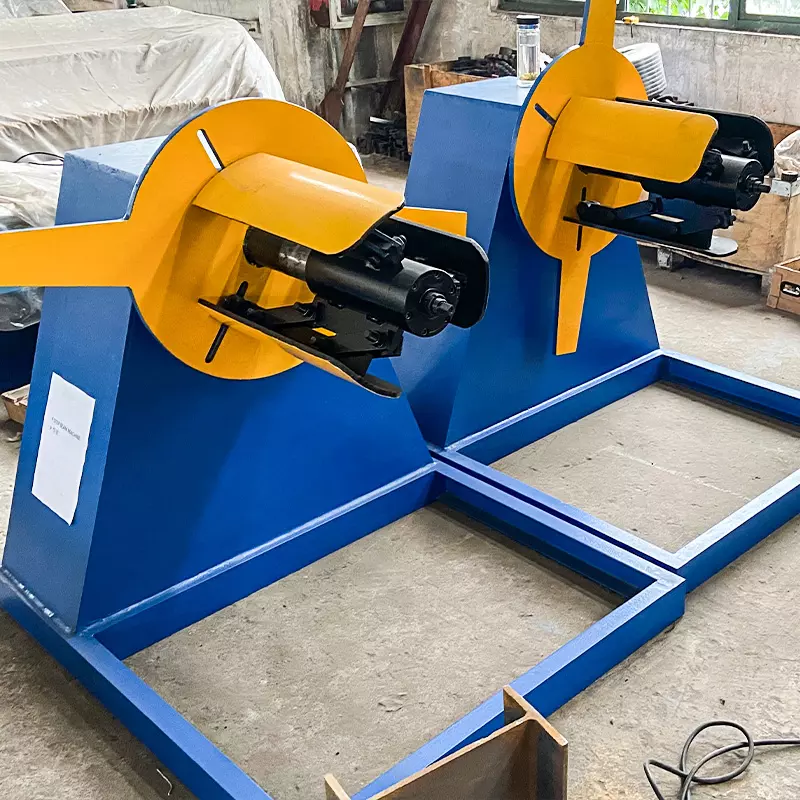
Step Beam Roll Forming Machine Workflow: From Start to Finish
Understanding the workflow of a Step Beam Roll Forming Machine can help you optimize production and identify areas for improvement. Let’s break it down step by step—literally:
Step 1: Material Feeding
The process begins with feeding raw sheet metal or coil into the machine. Advanced machines, like those from Wuxi Sunway Machinery, feature automatic feeding systems that minimize manual intervention and speed up operations.
Step 2: Roll Forming
The material passes through a series of rollers, each incrementally bending it closer to the final step beam profile. Think of it as molding clay, but on a much larger and more precise scale.
Step 3: Punching
For beams that require holes (e.g., for bolts or connectors), the machine incorporates hydraulic or mechanical punching systems. This step is vital for creating functional, versatile beams.
Step 4: Cutting
Once the beam reaches the desired length, a cutting system—usually hydraulic—slices it to size. The precision here is key to reducing waste and ensuring beams fit perfectly in their intended applications.
Step 5: Quality Inspection
After cutting, the beams are inspected for defects or inconsistencies. Automated systems can integrate quality control features, such as laser measurement, to catch errors in real time.
Step 6: Stacking and Packaging
The finished beams are neatly stacked and packaged, ready for transportation or storage. Some machines even include automatic stacking systems for added convenience.
By following this streamlined workflow, manufacturers can produce high-quality step beams with minimal waste and maximum efficiency.
Environmental Impact of Step Beam Roll Forming Machines
Let’s talk sustainability. With industries worldwide focusing on reducing their carbon footprint, the environmental impact of manufacturing processes has never been more important. So, how do Step Beam Roll Forming Machines measure up?
1. Energy Efficiency
Modern machines are designed with energy-saving components, such as servo motors and efficient hydraulic systems. This not only reduces operational costs but also minimizes energy consumption.
2. Material Utilization
One of the main advantages of roll forming is its ability to minimize material waste. Unlike traditional methods like stamping, roll forming cuts down on scrap, making it a more sustainable choice.
3. Recyclable Materials
The materials processed by these machines—like steel and aluminum—are 100% recyclable. This makes the entire production cycle more environmentally friendly.
4. Reduced Emissions
Automated systems reduce the need for manual labor and energy-intensive operations, leading to lower overall emissions.
At Wuxi Sunway Machinery, we’re committed to sustainability. Our machines are designed to be energy-efficient and environmentally friendly, helping your business meet modern green standards.
Step Beam Roll Forming Machine vs. Other Roll Forming Machines
How does a Step Beam Roll Forming Machine compare to other roll forming machines? Let’s pit it against some popular alternatives to see how it stacks up.
| Feature | Step Beam Roll Forming Machine | C/Z Purlin Roll Forming Machine | Cable Tray Roll Forming Machine |
|---|---|---|---|
| Primary Application | Step beams for racking and shelving | Purlins for structural frameworks | Cable trays for wiring management |
| Material Thickness | 1.5mm–3.5mm | 1.5mm–3.0mm | 0.3mm–2.5mm |
| Production Speed | 10–20 meters per minute | 15–25 meters per minute | 10–15 meters per minute |
| Customization Options | High | High | Moderate |
| Cost Range (USD) | $30,000–$60,000+ | $25,000–$50,000 | $15,000–$40,000 |
Key Takeaways:
- If you’re in the racking or shelving industry, a Step Beam Roll Forming Machine is your best bet.
- For structural applications, the C/Z Purlin Roll Forming Machine offers better versatility.
- Cable Tray Roll Forming Machines excel in lightweight applications like electrical wiring management.
Want to explore more machine options? Check out Wuxi Sunway Machinery for a full range of roll forming solutions.
Advantages of Step Beam Roll Forming Machines
Why should you invest in a Step Beam Roll Forming Machine? Here are the top advantages:
1. High Efficiency
With production speeds of up to 20 meters per minute, these machines can handle large-scale manufacturing with ease.
2. Consistent Quality
The precision of roll forming ensures that every beam meets strict dimensional and structural standards.
3. Versatility
From pallet racking to mezzanine floors, step beams are used in a wide range of applications. A single machine can cater to multiple industries.
4. Cost-Effectiveness
While the initial investment might seem high, the long-term savings in labor, material waste, and production efficiency make these machines a smart choice.
5. Customization
Need a specific profile or material? Custom machines can be designed to meet unique requirements, ensuring you get exactly what you need.
FAQs About Step Beam Roll Forming Machines
Still have questions? Let’s answer some of the most common queries about Step Beam Roll Forming Machines.
| Question | Answer |
|---|---|
| Can the machine handle multiple profiles? | Yes, many machines are designed to produce multiple beam profiles with quick changeovers. |
| What’s the average production capacity? | Most machines can produce 5,000–10,000 meters of beams per day, depending on the material and settings. |
| Is on-site training provided? | Yes, manufacturers like Wuxi Sunway Machinery offer on-site training as part of their service. |
| What maintenance is required? | Regular cleaning, lubrication, and roller inspections are essential for maintaining performance. |
| Are financing options available? | Absolutely! Many suppliers, including Wuxi Sunway Machinery, offer flexible financing plans. |
Step Beam Roll Forming Machine Reviews: What Are Customers Saying?
Customer feedback can provide valuable insights into the performance and reliability of a machine. Here’s what manufacturers are saying about Wuxi Sunway Machinery Step Beam Roll Forming Machines:
- “Unmatched Precision”: “The beams we produce are flawless. The machine’s accuracy and speed have significantly improved our production line.” — Logistics Manufacturer, Germany.
- “Great Support”: “Wuxi Sunway’s team was with us every step of the way, from installation to training. Their after-sales service is top-notch.” — Warehouse Solutions Provider, USA.
- “Cost-Effective”: “The machine paid for itself within a year. It’s incredibly efficient and has reduced our material waste by 15%.” — Racking System Manufacturer, Australia.
Conclusion: The Future of Step Beam Manufacturing
A Step Beam Roll Forming Machine is more than just a piece of equipment—it’s an investment in efficiency, quality, and scalability. Whether you’re producing beams for pallet racks, industrial shelving, or construction frameworks, this machine offers the precision and versatility needed to meet today’s demanding industrial standards.
And when it comes to choosing a supplier, Wuxi Sunway Machinery is the clear choice. With a global reputation for quality, innovation, and customer support, they’re the ideal partner to help your business succeed in 2025 and beyond.
So, what’s next? Ready to revolutionize your production line? Reach out to Wuxi Sunway Machinery today and let’s roll into a more efficient future together!

